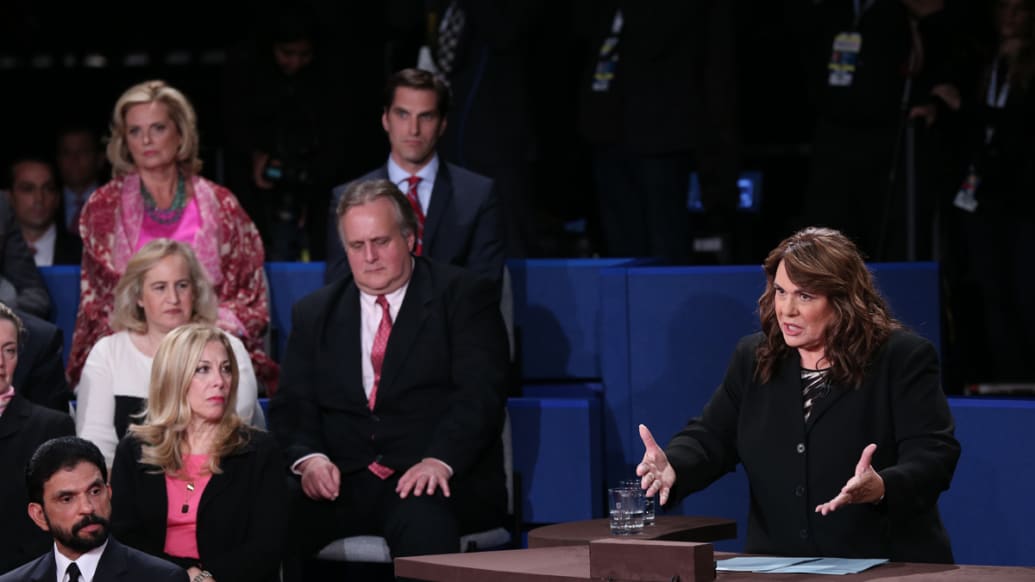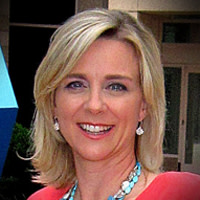With five words, Candy Crowley placed herself at the center of Tuesday’s presidential debate—underscoring her determination to restrain the candidates.
It was no surprise to anyone who has followed the CNN anchor’s blunt-spoken style that she would try to set the record straight. But it landed her in a cauldron of controversy at the face-off at Hofstra University.
The debate “didn’t faze me as much as everyone seemed to think it did,” Crowley told me Wednesday morning.
As for Republicans who ripped her as unfair, an obviously tired Crowley said, “I’m sorry they’re upset, but tomorrow they’ll be upset about something else, as will the Democrats.”
Despite the town-hall format, Crowley—the second female moderator of a presidential debate—had signaled for days that she would inject herself forcefully into the debate between President Obama and Mitt Romney. And that she did.
When Romney was mounting an attack on the president for the administration’s shifting explanations of the attack of American diplomats in Libya, he hit a nerve.
“For fourteen days he refused to call it an act of terror,” Romney said.
Obama objected, telling Romney to check the transcript. At that point, Crowley attempted a rare feat during a presidential debate: fact-checking in real time. “He did in fact, sir,” Crowley told Romney referring to the president’s initial description of the assault on the U.S. Consulate.

Crowley told me she tried to clear up the question of how Obama had originally characterized the attack because “I was trying to move the conversation along. They got stuck on this.”
The Libyan moment was hardly the only time they tangled. After each audience question, she peppered both candidates with queries of her own, pressing them to be more specific. And she raised her voice with both Obama and Romney, refusing to be trampled when they wanted to keep talking and she wanted to move on. Crowley was unfailingly polite but firm, and at times held back while the two candidates circled and interrupted each other.
“There was a territorial imperative thing going on,” Crowley says. “But I didn’t feel the tension that everyone else seemed to feel.”
Republicans in the spin room and on Twitter and Facebook assailed Crowley as unfair in the face of network polls showing a narrow Obama victory.
Former New Hampshire governor John Sununu told reporters, “Both the moderator and the president were dead wrong on the Libya question.” He added, “Candy was wrong. Candy had no business doing that … I think Candy Crowley decided she wanted to be an active part of the debate.”
Crowley gave her detractors an opening by allowing Obama to speak more than three minutes longer than his opponent.
Democrats, however, spoke favorably of Crowley. “Governor Romney was fact-checked by the moderator,” said Obama senior strategist David Axelrod.
Crowley hardly let the president off the hook, asking him about the long-term unemployed: “Are we looking at the new normal?”
As the debate barreled along, Crowley offered such admonitions as “Governor Romney, can you make it short?” and “I want to move you both along.” Crowley says her main goal in trying to rein in the combatants was to allow more questions from the undecided voters in the audience.
There was a pregame flap about a memorandum of understanding between the campaigns saying “the moderator will not ask follow-up questions or comment on either the questions asked by the audience or the answers of the candidates.” But Crowley never saw the memo and made clear she did not feel bound by it.
In an earlier interview with The Daily Beast, Crowley said her job was to “mistrust” politicians, which may explain the skeptical edge to many of her questions.
Reflecting on the debate after just a few hours’ sleep, Crowley says she gave no thought of being the first woman in 20 years to moderate a presidential debate. “Once you’re out there, it doesn’t really matter.”
